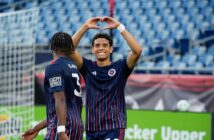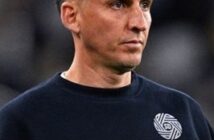English football has the knack of creating enigmatic characters, particularly those whose careers are established across several decades.
Perhaps none more so than striker Richard Pacquette – of Harefield United, and formerly of, well, I’ll let this graphic from 433 do the talking.

Credit – 433 (2019)
In a recent interview with TotalSport, Pacquette opened up on the struggles of change, dropping into non-league and the chaotic plate spinning of semi-professional football.
Donning a Q.P.R jacket, the 38-year-old started chronologically at the beginning. It was the R’s who gave him his first professional contract at the turn of the century, after humble beginnings in Brent.
“We played loads of games against other boroughs in London, and I didn’t get scouted by Q.P.R directly, rather by Norwich City.
“My cousin played for Q.P.R and I always used to go to watch. In my year group at Q.P.R, there was a lot of players who I played with for Brent and Middlesex. I asked their manager if I could come for training, and it went from there.”
During those early years at Loftus Road, Richard played alongside the now national treasure, Peter Crouch. Despite his youthful awkwardness, he could always tell there was something special about the 2006 FA Cup winner.
“When I made my debut in the old Division One, ‘Crouchy’ was on loan from Tottenham. I played up front with him, and alongside Chris Kiwomya – formerly of Arsenal.
“When he first came, we were surprised at how technically good he was. He’s a lovely guy and was a pleasure to play with.”
In the many years of Pacquette’s career, we have seen a change in footballing styles across all tiers of English football.
The big man, little man combination is a dying art, as is the solitary target man. Many teams favour the atypical quick, nippy striker with a good leap rather than a traditional Sunday League sh*thouse.
Even the best in that genre in world football, namely Romelu Lukaku, have to be multi-faceted in their approach, with one-dimensionality outdated. Crouch was ahead of his time in that respect, and is continuing to develop to this day off the field.
“I think that being technically good, brave and strong are key to being a target man, and to be able to understand that the team are relying on you to get into the game.”
After loan spells away from the club, Pacquette returned to QPR revitalised and ready to contribute to their promotion push.
The R’s were hovering outside the playoff places and with Pacquette’s return came a form boost. Pacquette proved his fitness after a loan spell, had a good run in the side and scored an important goal against Barnsley. He then helped his side from the bench more as an impact sub, with the R’s reaching the playoffs.
He played excellently off the bench in the first and second legs of the Playoff Semi-Final against Oldham Athletic, resulting in manager Ian Holloway opting to start him at Wembley against Cardiff.
From that moment onwards though, it would be spiral down the leagues for a man with clear ability. Once his spell with Q.P.R was up, so was his time as a regular in the Football League. In fact, he made just six appearances after leaving Loftus Road in the top four divisions.
Mentally though, this is taxing on any footballer. Having played at Wembley, almost becoming a Championship player – only to be playing for Worthing two years later.
“It was hard. “I turned down contracts in the Conference Premier because I wanted to play in the Football League – and that was my biggest mistake. I knew I was good enough, I should be playing at that level. I got sniffs and nothing materialised – and it was so hard.
“You have to come to terms with it. It’s so difficult as a young player to do that, but you have to think of working too. When you have good people around you, that does help though.”
It’s something that isn’t often thought about in the world of football actually, and it certainly struck a chord. How does a young footballer cope with this situation?
Having grown up knowing football and only football, the beckoning menace of the ‘real world’ is even more of a grim reaper. Not only this, but your childhood dream is still reachable, still achievable – but as every minute passes, the likelihood becomes slimmer and slimmer.
Pacquette though, for the love of his game, coped well given the circumstances he found himself in. He bagged 17 goals in his first season at Worthing. A year later, the then 23 year-old would join Havant and Waterlooville in February 2006. Under Ian Beard, Pacquette immediately felt comfortable.
“The players there were brilliant. It was run properly, despite the fact it was non-league. It felt like a proper football club.
“Even to this day I still check on their results.”
I can hear Football Trivia whizzes now. Havant and Waterlooville, mid-to-late noughties? Didn’t they take the lead twice at Anfield? You’d be correct.
The man who scored that special goal for the Hawks? A fresh faced Richard Pacquette.
“The feeling was unreal. I had the feeling that I was going to score from when the draw was made. We had a few opportunities from set-pieces and we knew about their zonal marking. If the ball was right, I’d get a sniff.
“When it happened, in front of the Kop, the feeling was crazy.”
Havant would succumb to a 5-2 defeat eventually, with Lucas Leiva, the aforementioned Crouch and a Yossi Benayoun hattrick denying Pacquette and his men the most famous victory in the history of the FA Cup. However, it doesn’t take away the achievement and memories created.
“There’s so many take-aways. Pre-game – we trained at Manchester United. The coaching staff and groundsman were all wishing us luck which was great.
“The coach journey – as soon as we turned the corner to get into the ground, we had all the fans clapping us in to the stadium ready by the players entrance. It sent shivers up our spines.
“Warming up on the pitch and seeing your family in stand, how amazing. But the walk on to the pitch with You’ll Never Walk Alone playing. It reduced some of us to tears. It gets louder and louder, and it was just crazy.”
Mentally though, Pacquette had scored a goal, reached a pinnacle, that could have been as much detrimental as it was savoured.
In music, we often hear the term ‘one hit wonders’ – artists who hit a peak which they could never reach again. Pacquette had done the footballing equivalent. His header hitting the back of the net at Anfield would find a level of ecstasy he would never find on a football pitch again. And at 23, he must have known that.
Despite this somewhat demotivating knowledge, his mentality on the subject is as composed as you’d expect.
“Everyone says – ‘you scored against Liverpool’. Yeah – I know. It is still the best moment of my career, and I started a Playoff Final at the Millennium Stadium.
“I wouldn’t say it undermines my career, but I use it for myself whilst I’m still playing to drive on my teammates. I use it’s positivity because they can also achieve that.”
2008 would be quite the successful year for Pacquette.
After scoring said goal, he would receive his first international call-up for Dominica. The Caribbean island side had reached unchartered territory when it came to World Cup qualification when they called for Pacquette’s assistance.
They faced Barbados in hope to face U.S.A in the next stage of qualification, and they very nearly achieved just that.
“After the Liverpool game, I got my call-up. The first leg was in Dominica, and all my family over there were buzzing as I hadn’t seen them in years.
“We drew 1-1 in the first leg, and I scored in front of my family. Sadly we lost 1-0 in Barbados, but it was such a great experience.
“It’s a shame because Dominica isn’t as up-to-date with football as the other islands. I’ve got friends who play for Grenada, Antigua, Montserrat – it’s done properly. But I’d definitely do it again if I was asked.”
Pacquette hasn’t featured for Dominica since, but he’s gone on to represent 20 more clubs in non-league. It may be seen externally as his inability to settle, but far from it.
Non-League culture is financially-based, cut-throat and volatile. Players don’t know where they’ll be from one month to the next.
“It’s a cocktail of non-league culture and work commitments, but mostly the former.
“A lot of people don’t understand. You go to club, who have a budget at the start of the season, and they don’t really do contracts. “If the team loses a few games, you get knocked out the FA Cup early, the chairman cuts the budget. If you’re on good money, you’re one of the first to go.
“And on a personal level, if a club offers you more money, you will go. I had a young daughter when I was coming up the league, and I had to look after her.
“When you’re in non-league football, you aren’t guaranteed to last a season. If you get injured for a long-time, you’re not paid.”
But despite the unstable world of non-league, Pacquette is still going strong at 38, two decades after making his senior debut.
An enigma – talented, nomadic and hard-working. Richard Pacquette’s footballing legacy stretches far more than a goal at Anfield.
![Prost International [PINT]](https://prostinternational.com/wp-content/uploads/2021/08/PINTtFontLogoRoboto1536x78.jpg)



